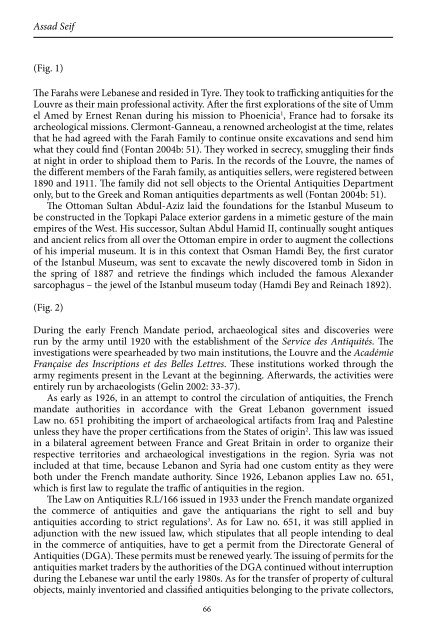Countering
Book_observatory_illicit_traffic_version%20issuu
Book_observatory_illicit_traffic_version%20issuu
Create successful ePaper yourself
Turn your PDF publications into a flip-book with our unique Google optimized e-Paper software.
Illicit Traffick in Cultural Property in Lebanon<br />
Law R.L. no. 166 envisage this possibility in Article no. 44. Nevertheless, the DGA has a<br />
pre-emptive right over these antiquities.<br />
In 1988, after 13 years of civil war, and due to the lack of control over the Lebanese<br />
antiquity market, the Minister of Tourism issued Ministerial Decision no. 8 banning all<br />
kind of export of antiquities from the Lebanese territory 4 . The Preamble of the Decree<br />
makes clear that the decision was taken in response to the different security issues the<br />
country was facing at the time, i.e. illicit export, looting recorded during the civil war and<br />
the need to protect the national cultural heritage. This decision was followed the same<br />
year by another Ministerial Decision no. 14 aiming at the organization of the antiquity<br />
market inside Lebanon.<br />
In the early aftermath of the civil war, the Minister of Tourism issued a new Ministerial<br />
Decision no. 8 of 27 February 1990, which combined the previous two decisions. The<br />
new decision not only prohibited all kind of export of archaeological objects from<br />
Lebanon but also banned the commerce of antiquities inside the country. This was done<br />
by discontinuing the release of antiquities trade permits by the DGA. However, freezing<br />
the antiquities trade led also to a collateral damage which is the loss of control by the<br />
authorities on the market itself. As a result, the illicit trade of national cultural objects<br />
altogether with trans-border illicit traffic have increased.<br />
A few months later, Lebanon ratified the 1970 UNESCO Convention on the Means<br />
of Prohibiting and Preventing the Illicit Import, Export and Transfer of Ownership of<br />
Cultural Property by Law no. 21 voted at the Parliament on 30 October 1990. Since<br />
then, Lebanon is applying not only the previous Laws and decisions regarding the trade<br />
in antiquities, but also the 1970 UNESCO Convention, which was integrated into the<br />
National Laws on Cultural Properties 5 . Furthermore, the ratification of the Convention<br />
has enabled Lebanon to expand the span of protected types of material cultural objects<br />
which comprise archaeological objects, i.e. objects prior to 1700 AD as stipulated by Law<br />
R.L. no. 166, as well as all types of cultural properties dating from later periods.<br />
The most recent law on cultural property (Law no. 37) was issued in 2008. However,<br />
this law does not include a section on antiquities trade per say since the articles of the<br />
1933 Law R.L./166 are always applied. Nevertheless, it includes regulatory measures<br />
regarding the transfer of cultural properties and their import as a direct application of<br />
the 1970 UNESCO Convention 6 .<br />
Importing cultural properties into Lebanon<br />
Even if trading in and exporting of antiquities and cultural goods were banned since the<br />
late 1980s, importing these objects and goods through proper channels and procedures<br />
was never subject to any legal restriction. The law is very clear on this matter: any<br />
antiquities which are to be imported to Lebanon require legal export papers from the<br />
country of origin. The procedure is quite simple: the DGA inspects the objects to be<br />
imported at customs and delivers an official document allowing import, if conditions<br />
conform to those stipulated in Article no. 44 of Law R.L./166 in the case of ownership<br />
change. Nevertheless, according to Ministerial Decision no. 8, 27 February 1990, reexporting<br />
the same goods will not be possible. Also, Law no. 37 of 2008 on cultural<br />
properties, Articles 17 and 18, prohibits import of classified cultural properties from<br />
a State with which Lebanon maintain diplomatic relations, without the consent of that<br />
State. If there is no consent (official documents), such properties are seized and returned<br />
to their original owner, provided that the requesting State:<br />
67


